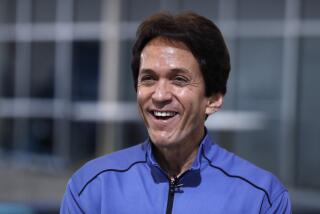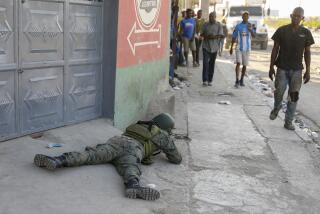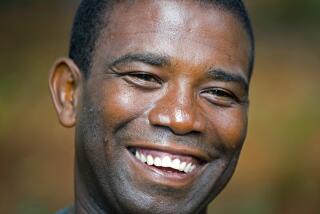On Flight Home, Aristide Savors the Moment
- Share via
ABOARD U.S. AIR FORCE FLIGHT 3399 — The night before his return to Haiti, Jean-Bertrand Aristide said, he stayed up until 4:30 in the morning working on his speech. Then he went to bed in his Washington apartment, his last night of sleep in exile.
Half an hour later, the telephone rang. It was Aristide’s mother, calling from Miami with some last-minute advice.
“Be sweet,” she told her son. “Be very cool. . . . Celebrate your reconciliation.”
And would he take her advice? “Sure,” Aristide said Saturday with a broad smile--a sweet smile, even--speaking with reporters on the U.S. Air Force plane taking him back to Port-au-Prince. “It went straight to my heart.”
On the 3 1/2-hour flight, Aristide sat in a large captain’s chair at the head of a small conference table, surrounded by his closest aides, and put the finishing touches on his speech. The Haitian president used the cabin that is normally occupied by the senior aides to Secretary of State Warren Christopher during his trips abroad; Christopher, who was also aboard the flight, kept largely to his own private cabin.
When a reporter asked why Aristide had chosen to return to his native land aboard a U.S. Air Force plane--seemingly an odd note for a poor country fiercely proud of its independence--Aristide smiled and said it was because the U.S. military intervention in Haiti “is so peaceful.”
A senior U.S. official said the White House was astonished when Aristide asked to ride to Haiti as a guest on Christopher’s plane.
National Security Adviser Anthony Lake “assumed that Aristide would want to charter a plane of his own,” the official said. “But Aristide came back and said no, there’s no hiding the fact that he is returning thanks to American intervention--so he might as well capitalize on it.”
In effect, the official suggested, Aristide was reminding his opponents that he has the full weight of the United States behind his newly re-established regime.
For most of his three years in exile, Aristide struck many in Washington--even some of his own supporters--as a prickly, difficult man who revealed little of himself save an iron will to return home and an abiding suspicion of the United States government. That Aristide was the one on display last month, when he stolidly refused to accept a deal for his return negotiated by former President Jimmy Carter until he was fully convinced of its virtues.
But in recent weeks, a new Aristide has been on display: ebullient, confident and occasionally even straightforward in his political pronouncements.
“There has been a visible change,” said John Plebani, a Washington lawyer who has been one of the Clinton Administration’s main day-to-day liaisons with Aristide. He laughed. “It’s been visible ever since Sept. 19”--the date the first of more than 20,000 U.S. troops landed in the Caribbean nation.
The Administration has pinned large hopes on the confidence and ability of this slight man, and puts great store in the notion that exile has transformed him from a mass-movement rabble-rouser to a more tempered and moderate statesman.
“The time for struggle and resistance is past,” Christopher said, just as a reminder, as he loaded Aristide on the plane in Washington on Saturday morning. “The time for governance has begun.”
Speaking to a few reporters accompanying him on his flight, Aristide hit the conciliatory notes his American backers had hoped for--themes he would also stress in his speech mostly in Creole a few hours later to a chanting, swaying crowd in Port-au-Prince.
“I am hopeful we will succeed through reconciliation, peace, respect for every single citizen,” Aristide said. “Once we can create political stability, once we share this peaceful reconciliation, we have the most important key to open the door of the economy.”
A few minutes before noon, as Aristide sat chatting with Christopher in the airplane’s forward cabin, President Clinton’s special envoy for Haiti, William H. Gray III, looked out the window, saw mountains below and exclaimed: “That’s Haiti!”
Aristide, who had not been facing the window, leaped up and leaned over to look. Another sweet smile spread across his face, and he shook his head as if not quite believing the day was real.
Just after noon, the plane touched down. Aristide, helped by his aides, bowed his head and donned a red and blue presidential sash over his dark double-breasted suit.
He paused at the door of the plane, squared his shoulders and walked out into the warm, almost-muggy air of Port-au-Prince. As American troops of the 10th Mountain Division stood guard, a Haitian military band struck up “Ruffles and Flourishes” and the Haitian national anthem.
Aristide grinned again, waved and marched down the stairs. One minute before, he had been a guest of the United States government. Now he was again president of Haiti.
More to Read
Sign up for Essential California
The most important California stories and recommendations in your inbox every morning.
You may occasionally receive promotional content from the Los Angeles Times.














